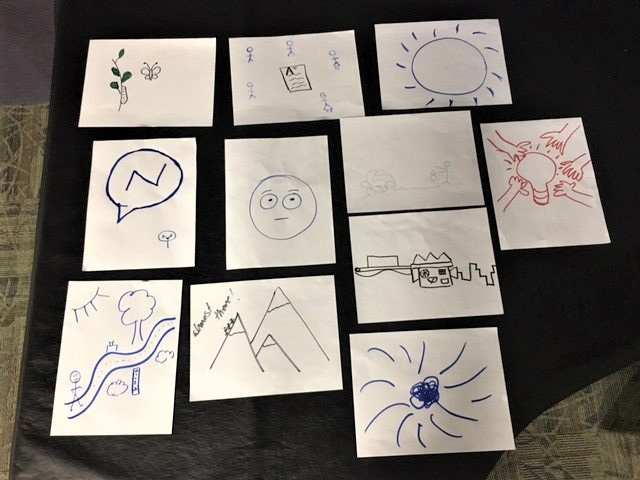“Thanks for your excellent facilitation of this process.”
These are gratifying words to receive in an email 3/4 of the way through a 10-month strategic planning process.
The ebb and flow of a longer facilitated process are uniquely different than that of shorter one-day to three-month processes. And, the way in which I ask for feedback and evaluation varies, too.
During short-term projects of under three months, I obtain immediate feedback on how the work is going and about the services I am providing. My clients and I assess, during each meeting, usually through a reflection conversation. During the facilitated session, I obtain feedback and assessment in a variety of ways including:
- ORID ( Focused Conversation) at the end of the session
- Plus/Change
- What do I like? What do I need less of? What do I need more of?
- Red, yellow, green lights
- Drawings of the way a person feels
- Use of images
- Body sculpture (individual and group)
- Surveys
These techniques are easily adapted to in-person or online sessions.
How do I obtain feedback from the client about a longer facilitated process and adjust accordingly?
For a process of over three months, I deliberately schedule reflection, monitoring, and assessment conversations into the process. I hold them each month at a minimum and more often during the intense service delivery time of the process. Because of the different events and products at each stage of the process, the feedback from the client can vary incredibly. During one long process, my client was very complimentary of my facilitated sessions and report during the first phase. In the second phase, we conducted a series of community engagement online events and wrote a report. The client had questions and concerns about my interpretation of the input. Not as complimentary! In the third phase, I facilitated a 1½ day in-person strategic planning session. The participants and client said it was highly engaging, productive, built the team, and “was not tedious.” (Love that phrase!)
Unique approaches to evaluating long-term processes
- At the proposal stage, I write reflection conversations and assessment methods into my process.
- At start-up meetings with the client, I explain why we need these conversations and invite them to comment and we agree about the frequency and techniques to use.
- My go-to method for feedback and evaluation is the ORID ( Focused Conversation) and I facilitate it at the end of every meeting and session.
- Other methods are similar to those I employ during short-term processes as listed above. I choose based on the stage of the process, my sense of the group, the requests by the client, the time available, etc.

I invited one group, at an in-person strategic planning session, six months into the project to draw an image of how they felt about what they had achieved.
And no matter how intentionally I plan ways to obtain feedback, the unexpected feedback in a casual email is extremely powerful. The client obviously felt at the 3/4 mark of the process, that it is going well overall.
I enjoy talking about facilitation, strategic planning, feedback, and evaluation! Please contact me at barbpedersen@shaw.ca with questions, comments, and inquiries.
